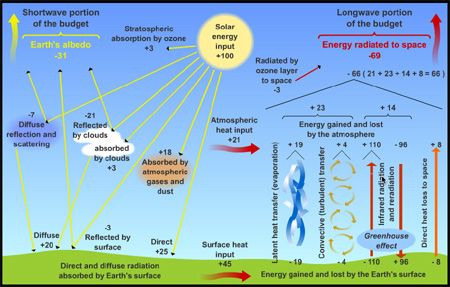Energy flows from areas of higher temperature to areas of lower temperature. This is the driving force of weather. Heat is transferred through the atmosphere by radiation (waves), convection (through air particles), and conduction (direct contact). An 'Energy Budget' of the atmosphere is shown in the graphic below:

Let's discuss the features of the Energy Budget:
With the energy emanating from the sun (they give that energy a value of = +100), you can see where it goes:
- 3 is absorbed by ozone in the stratosphere
- The rest happens in the troposphere:
- 31 is reflected back, mostly by clouds and some through diffusion reflection by gases and a little reflected by the surface - known as the Earth's albedo
- 3 is absorbed by clouds
- 18 is absorbed by atmospheric gases and dust
- 20 diffuses through gases to the surface
- 25 is directly given to the surface from the sun
Following, energy gets transferred/released in the following ways:
- 3 is radiated by ozone in the stratosphere
- The rest happens in the troposphere
- 23 is released via evaporation in the form of latent heat and turbulence in the form of convective transfer
- A total of 14 is lost due to infrared radiation due to the greenhouse effect
- 8 is directly released to space
That total, plus the albedo equals the +100 given by the sun.
As you can see above, almost all energy transfer happens in the troposphere. Thus, the troposphere is the major zone of weather alongside where almost all human activity take place (execpt spacecraft and jet planes).
No comments:
Post a Comment